[English] 日本語
 Yorodumi
Yorodumi- PDB-7o15: ABC transporter NosDFY, nucleotide-free in lipid nanodisc, R-domain 2 -
+ Open data
Open data
- Basic information
Basic information
| Entry | Database: PDB / ID: 7o15 | |||||||||||||||||||||||||||||||||||||||||||||
|---|---|---|---|---|---|---|---|---|---|---|---|---|---|---|---|---|---|---|---|---|---|---|---|---|---|---|---|---|---|---|---|---|---|---|---|---|---|---|---|---|---|---|---|---|---|---|
| Title | ABC transporter NosDFY, nucleotide-free in lipid nanodisc, R-domain 2 | |||||||||||||||||||||||||||||||||||||||||||||
 Components Components |
| |||||||||||||||||||||||||||||||||||||||||||||
 Keywords Keywords | MEMBRANE PROTEIN / ABC Transporter complex / nucleotide-free | |||||||||||||||||||||||||||||||||||||||||||||
| Function / homology |  Function and homology information Function and homology informationABC-type transporter activity / periplasmic space / ATP hydrolysis activity / ATP binding / plasma membrane Similarity search - Function | |||||||||||||||||||||||||||||||||||||||||||||
| Biological species |  Pseudomonas stutzeri ATCC 14405 = CCUG 16156 (bacteria) Pseudomonas stutzeri ATCC 14405 = CCUG 16156 (bacteria) | |||||||||||||||||||||||||||||||||||||||||||||
| Method | ELECTRON MICROSCOPY / single particle reconstruction / cryo EM / Resolution: 3.8 Å | |||||||||||||||||||||||||||||||||||||||||||||
 Authors Authors | Mueller, C. / Zhang, L. / Lu, W. / Einsle, O. / Du, J. | |||||||||||||||||||||||||||||||||||||||||||||
 Citation Citation |  Journal: Nature / Year: 2022 Journal: Nature / Year: 2022Title: Molecular interplay of an assembly machinery for nitrous oxide reductase. Authors: Christoph Müller / Lin Zhang / Sara Zipfel / Annika Topitsch / Marleen Lutz / Johannes Eckert / Benedikt Prasser / Mohamed Chami / Wei Lü / Juan Du / Oliver Einsle /    Abstract: Emissions of the critical ozone-depleting and greenhouse gas nitrous oxide (NO) from soils and industrial processes have increased considerably over the last decades. As the final step of bacterial ...Emissions of the critical ozone-depleting and greenhouse gas nitrous oxide (NO) from soils and industrial processes have increased considerably over the last decades. As the final step of bacterial denitrification, NO is reduced to chemically inert N (refs. ) in a reaction that is catalysed by the copper-dependent nitrous oxide reductase (NOR) (ref. ). The assembly of its unique [4Cu:2S] active site cluster Cu requires both the ATP-binding-cassette (ABC) complex NosDFY and the membrane-anchored copper chaperone NosL (refs. ). Here we report cryo-electron microscopy structures of Pseudomonas stutzeri NosDFY and its complexes with NosL and NOR, respectively. We find that the periplasmic NosD protein contains a binding site for a Cu ion and interacts specifically with NosL in its nucleotide-free state, whereas its binding to NOR requires a conformational change that is triggered by ATP binding. Mutually exclusive structures of NosDFY in complex with NosL and with NOR reveal a sequential metal-trafficking and assembly pathway for a highly complex copper site. Within this pathway, NosDFY acts as a mechanical energy transducer rather than as a transporter. It links ATP hydrolysis in the cytoplasm to a conformational transition of the NosD subunit in the periplasm, which is required for NosDFY to switch its interaction partner so that copper ions are handed over from the chaperone NosL to the enzyme NOR. | |||||||||||||||||||||||||||||||||||||||||||||
| History |
|
- Structure visualization
Structure visualization
| Structure viewer | Molecule:  Molmil Molmil Jmol/JSmol Jmol/JSmol |
|---|
- Downloads & links
Downloads & links
- Download
Download
| PDBx/mmCIF format |  7o15.cif.gz 7o15.cif.gz | 272.2 KB | Display |  PDBx/mmCIF format PDBx/mmCIF format |
|---|---|---|---|---|
| PDB format |  pdb7o15.ent.gz pdb7o15.ent.gz | 214.3 KB | Display |  PDB format PDB format |
| PDBx/mmJSON format |  7o15.json.gz 7o15.json.gz | Tree view |  PDBx/mmJSON format PDBx/mmJSON format | |
| Others |  Other downloads Other downloads |
-Validation report
| Arichive directory |  https://data.pdbj.org/pub/pdb/validation_reports/o1/7o15 https://data.pdbj.org/pub/pdb/validation_reports/o1/7o15 ftp://data.pdbj.org/pub/pdb/validation_reports/o1/7o15 ftp://data.pdbj.org/pub/pdb/validation_reports/o1/7o15 | HTTPS FTP |
|---|
-Related structure data
| Related structure data |  12690MC 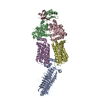 7o0yC 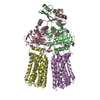 7o0zC 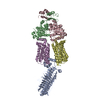 7o10C 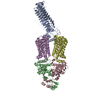 7o11C 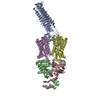 7o12C 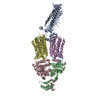 7o13C 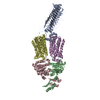 7o14C 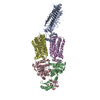 7o16C 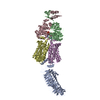 7o17C 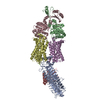 7osfC 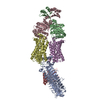 7osgC 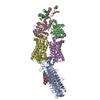 7oshC 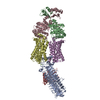 7osiC 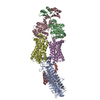 7osjC 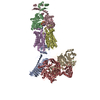 7qbaC 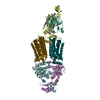 7znqC M: map data used to model this data C: citing same article ( |
|---|---|
| Similar structure data | Similarity search - Function & homology  F&H Search F&H Search |
- Links
Links
- Assembly
Assembly
| Deposited unit | 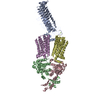
|
|---|---|
| 1 |
|
- Components
Components
| #1: Protein | Mass: 48258.500 Da / Num. of mol.: 1 Source method: isolated from a genetically manipulated source Source: (gene. exp.)  Pseudomonas stutzeri ATCC 14405 = CCUG 16156 (bacteria) Pseudomonas stutzeri ATCC 14405 = CCUG 16156 (bacteria)Production host:  | ||||||||||
|---|---|---|---|---|---|---|---|---|---|---|---|
| #2: Protein | Mass: 33821.703 Da / Num. of mol.: 2 Source method: isolated from a genetically manipulated source Source: (gene. exp.)  Pseudomonas stutzeri ATCC 14405 = CCUG 16156 (bacteria) Pseudomonas stutzeri ATCC 14405 = CCUG 16156 (bacteria)Gene: nosF / Production host:  #3: Protein | Mass: 29449.203 Da / Num. of mol.: 2 Source method: isolated from a genetically manipulated source Source: (gene. exp.)  Pseudomonas stutzeri ATCC 14405 = CCUG 16156 (bacteria) Pseudomonas stutzeri ATCC 14405 = CCUG 16156 (bacteria)Gene: nosY / Production host:  #4: Chemical | ChemComp-MG / | #5: Water | ChemComp-HOH / | Has ligand of interest | Y | Has protein modification | N | |
-Experimental details
-Experiment
| Experiment | Method: ELECTRON MICROSCOPY |
|---|---|
| EM experiment | Aggregation state: PARTICLE / 3D reconstruction method: single particle reconstruction |
- Sample preparation
Sample preparation
| Component | Name: ABC Transporter NosFY in complex with accessory periplasmic protein NosD Type: COMPLEX Details: Nucleotide-free state in lipid nanodisc, R-domain conformation 2 Entity ID: #1-#3 / Source: RECOMBINANT |
|---|---|
| Source (natural) | Organism:  Pseudomonas stutzeri ATCC 14405 = CCUG 16156 (bacteria) Pseudomonas stutzeri ATCC 14405 = CCUG 16156 (bacteria) |
| Source (recombinant) | Organism:  |
| Buffer solution | pH: 8 |
| Specimen | Conc.: 15 mg/ml / Embedding applied: NO / Shadowing applied: NO / Staining applied: NO / Vitrification applied: YES |
| Vitrification | Cryogen name: ETHANE |
- Electron microscopy imaging
Electron microscopy imaging
| Experimental equipment |  Model: Titan Krios / Image courtesy: FEI Company |
|---|---|
| Microscopy | Model: FEI TITAN KRIOS |
| Electron gun | Electron source:  FIELD EMISSION GUN / Accelerating voltage: 300 kV / Illumination mode: FLOOD BEAM FIELD EMISSION GUN / Accelerating voltage: 300 kV / Illumination mode: FLOOD BEAM |
| Electron lens | Mode: BRIGHT FIELD / Cs: 2.7 mm |
| Image recording | Average exposure time: 1 sec. / Electron dose: 50 e/Å2 / Detector mode: COUNTING / Film or detector model: GATAN K3 (6k x 4k) |
| Image scans | Movie frames/image: 40 |
- Processing
Processing
| Software |
| ||||||||||||||||||||||||
|---|---|---|---|---|---|---|---|---|---|---|---|---|---|---|---|---|---|---|---|---|---|---|---|---|---|
| EM software |
| ||||||||||||||||||||||||
| CTF correction | Type: PHASE FLIPPING AND AMPLITUDE CORRECTION | ||||||||||||||||||||||||
| 3D reconstruction | Resolution: 3.8 Å / Resolution method: FSC 0.143 CUT-OFF / Num. of particles: 138319 / Symmetry type: POINT | ||||||||||||||||||||||||
| Refinement | Stereochemistry target values: CDL v1.2 | ||||||||||||||||||||||||
| Refine LS restraints |
|
 Movie
Movie Controller
Controller


















 PDBj
PDBj




